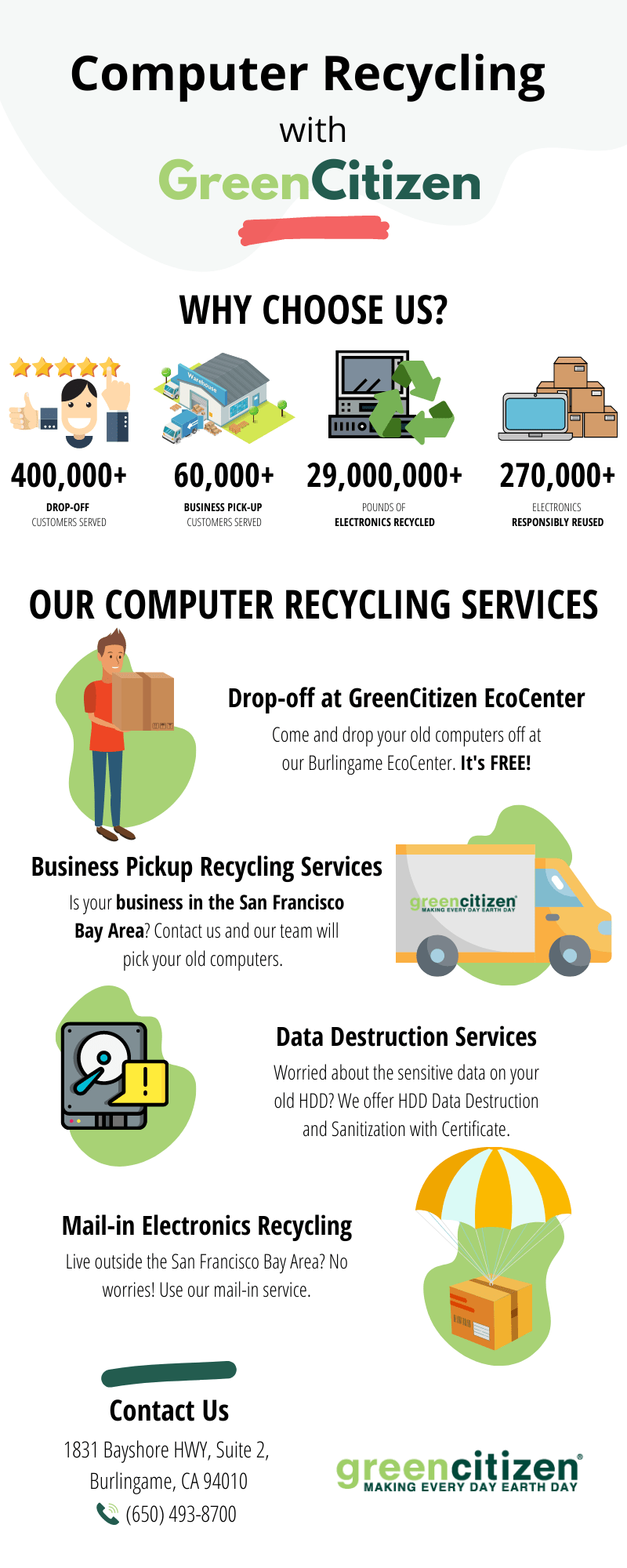Environmental Stewardship: The Value of Computer Recycling
Lasting IT Solutions: Trustworthy Computer System Recycling Solutions
As modern technology proceeds to progress at a quick rate, the concern of electronic waste, or e-waste, has actually ended up being a pushing worry for both companies and people alike. The incorrect disposal of computers and various other electronic gadgets not just contributes to environmental destruction, yet also positions considerable threats to human wellness. In light of this, the demand for credible computer recycling services has actually never ever been even more paramount. In this discussion, we will check out the environmental influence of e-waste, the benefits of responsible computer recycling, how to select a credible recycling solution, the recycling process for computers and electronic devices, and the function of federal government guidelines in e-waste administration. Join us as we discover the sustainable IT services that can help us browse the complexities of digital waste in a trustworthy and accountable way.
The Environmental Influence of E-Waste
The incorrect disposal of electronic waste, commonly referred to as e-waste, has substantial ecological ramifications. E-waste describes disposed of electronic tools such as smart devices, televisions, and computers (computer recycling). These tools have unsafe materials such as lead, mercury, cadmium, and brominated fire retardants, which can be unsafe to both human wellness and the environment if not appropriately handled
When e-waste is poorly thrown away, it typically winds up in garbage dumps or is blazed, launching hazardous compounds right into the water, dirt, and air. The launch of these hazardous products can infect groundwater, pollute the air, and contribute to dirt destruction, presenting major wellness threats to neighboring communities and communities.
Additionally, the inappropriate disposal of e-waste additionally contributes to the deficiency of natural deposits. computer recycling. Many electronic gadgets consist of beneficial steels like gold, silver, and copper that can be recuperated and recycled if properly recycled. When e-waste is not recycled, these valuable sources are lost, and the demand for new raw products boosts, leading to boosted mining tasks and additional environmental degradation.
To mitigate the environmental effect of e-waste, appropriate recycling and disposal techniques have to be used. This consists of the liable collection, taking apart, and recycling of digital devices to recuperate beneficial products and make certain the risk-free monitoring of dangerous compounds. Applying efficient e-waste monitoring methods is critical to safeguard the atmosphere, conserve sources, and advertise a sustainable future.

Advantages of Accountable Computer Recycling
Effectively recycling computers supplies a wide variety of advantages, including ecological preservation and resource conservation. Liable computer system reusing not just assists prevent digital waste from ending up in landfills, however it also minimizes the requirement for basic materials and power in the production of brand-new gadgets.
Among the most substantial advantages of accountable computer system recycling is the preservation of the setting. When digital waste is incorrectly disposed of, it can release unsafe compounds such as lead, mercury, and cadmium right into the dirt and water, positioning a risk to ecosystems and human health and wellness. By recycling computers, these unsafe products can be safely removed and disposed of, decreasing the risk of contamination.
One more benefit is resource conservation. Computers have useful products like gold, copper, silver, and light weight aluminum, which can be recouped and reused through recycling procedures. By removing and recycling these materials, the need for extracting brand-new sources is decreased, saving all-natural sources and decreasing the ecological effect of source removal.
Additionally, responsible computer recycling aids to reduce power usage. Production brand-new computers needs a significant amount of power, from the removal of basic materials to the assembly procedure. By reusing computers and reusing their parts, the energy-intensive production procedure can be stayed clear of, resulting in a reduction in greenhouse gas exhausts and a much more lasting use of power sources.
Exactly How to Choose a Trustworthy Computer Recycling Service
When choosing a computer recycling solution, it is necessary to take into consideration a couple of key aspects to guarantee that have a peek at this site you choose a trustworthy and dependable supplier. First of all, it is critical to confirm if the reusing service adheres to proper ecological regulations and practices. A trustworthy provider will certainly have accreditations and accreditations that demonstrate their commitment to responsible recycling. Search for accreditations such as R2 (Accountable Recycling) or e-Stewards, which make certain that the reusing process satisfies rigorous criteria for environmental management and data safety and security. Second of all, check if the solution offers protected information destruction. Information safety is a vital worry when reusing computer systems, as delicate details saved on old gadgets can be vulnerable to theft or misuse. A credible recycling solution should have safe data destruction protocols in position, such as data wiping or physical devastation of storage tools. In addition, think about the solution's record and reputation. Seek testimonials or endorsements from previous customers to determine their degree of customer contentment and dependability. Consider the service's transparency and liability. A reliable provider must have the ability to give thorough details about their reusing procedure, including how they take care of unsafe materials and make certain appropriate disposal. By considering these variables, you can select a computer system recycling solution that is honest, trustworthy, and ecologically responsible.
The Recycling Refine for Computer Systems and Digital Gadgets
To make sure accountable disposal and decrease environmental effect, recognizing the recycling procedure for try these out computer systems and digital devices is important when picking a credible recycling solution. The recycling procedure for these tools typically entails several stages.
First of all, the gadgets are collected from individuals, companies, or drop-off factors. This collection procedure may include transport logistics and safe and secure taking care of to shield the sensitive data consisted of within the gadgets. When gathered, the tools are sorted based upon their kind, such as desktops, smart devices, or laptop computers.
After sorting, the devices undergo a complete data damage process to make sure that any kind of personal or delicate details is permanently removed. This action is important to safeguard the personal privacy and safety and security of companies and people. Data devastation methods might consist of wiping, degaussing, or physical destruction of the storage media.
Next, the gadgets are disassembled into their specific parts. This enables the splitting up of various products, such as plastics, steels, and circuit card. These products are after that sent to specialized reusing facilities for additional handling.
The recycling facilities make use of various methods to remove useful products from the digital waste. These materials can be recycled or repurposed in the production of new items. The continuing to be waste is gotten rid of in an ecologically accountable way, sticking to governing standards.
The Function of Government Regulations in E-Waste Management
Federal government regulations play a vital duty in the effective administration of e-waste. With the continuous development of the electronics sector and the increasing concern for ecological sustainability, the demand for appropriate disposal and recycling of electronic waste has actually come to be a lot more evident. Government policies help to ensure that e-waste is handled in a responsible and lasting fashion.
One of the main functions of government laws is to establish standards and standards for e-waste management. These laws specify the proper approaches for collection, transport, and recycling of electronic waste. By developing these requirements, governments can make certain that e-waste is taken care of in such a way that minimizes its impact on the environment and human health and wellness.
Federal government policies likewise play a critical role in enforcing the appropriate disposal of digital waste. They call for suppliers and stores to take responsibility for the products they offer and generate. This consists of executing take-back programs, where producers are accountable for accumulating and recycling electronic waste from customers. These regulations help to shift the worry of e-waste administration from the individual consumer to the industry, making certain that electronic waste is taken care of in a more lasting manner.

Final Thought
Finally, click here for more info it is important to consider the ecological influence of e-waste and select a trustworthy computer recycling service to properly get rid of digital devices. By adhering to government guidelines and involving in appropriate reusing procedures, we can reduce the unfavorable results of e-waste on the setting and promote a much more lasting future.
In this conversation, we will explore the ecological influence of e-waste, the benefits of responsible computer system recycling, how to choose a reliable recycling service, the reusing procedure for computer systems and electronic gadgets, and the role of government policies in e-waste administration. Computers consist of valuable materials like gold, silver, copper, and aluminum, which can be recouped and recycled with reusing processes.In addition, accountable computer system recycling assists to lower energy intake. Data safety is a critical concern when recycling computer systems, as sensitive info kept on old devices can be susceptible to burglary or abuse. By taking into consideration these elements, you can pick a computer reusing solution that is ethical, reputable, and environmentally liable.